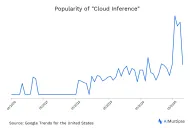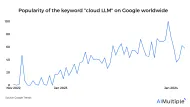LLM

Cloud Inference: 3 Powerful Reasons to Use in 2025
Deep learning models achieve high accuracy in tasks like speech recognition and image classification, often surpassing human performance. However, they require large training datasets and significant computational power. Cloud inference provides a scalable solution to handle these demands efficiently. Explore cloud inference, compare it to on-device inference, and highlight its benefits and challenges.

Cloud LLM vs Local LLMs: 3 Real-Life examples & benefits
In 2025, Cloud LLMs and Local LLMs are transforming business operations with unique advantages. Cloud LLMs, powered by advanced models like Grok 3, o3, and GPT-4.1, offer exceptional scalability and accessibility. Conversely, Local LLMs, driven by open-source models such as Qwen 3, Llama 4, and DeepSeek R1, ensure superior privacy and customization.
Large Multimodal Models (LMMs) vs LLMs in 2025
We evaluated the performance of Large Multimodal Models (LMMs) in financial reasoning tasks using a carefully selected dataset. By analyzing a subset of high-quality financial samples, we assess the models’ capabilities in processing and reasoning with multimodal data in the financial domain. The methodology section provides detailed insights into the dataset and evaluation framework employed.
LLM Data Guide & 6 Methods of Collection in 2025
In the expanding AI and generative AI market (Figure 1), large language models (LLMs) have emerged as pivotal. These models empower machines to generate human-like content, heavily reliant on quality data. Here, we present a guide for business leaders on accessing and managing LLM data, offering insights into collection methods and data collection services.
Compare 10+ LLMs in Healthcare in 2025
Large language models (LLMs) are increasingly being applied in healthcare to support clinical tasks such as medical question answering, patient communication, and summarizing medical records.
Top 10 Vector Database Use Cases in 2025
Processing, storing, and retrieving vast amounts of information rapidly and efficiently is paramount for businesses. Vector databases are a critical emerging technology in addressing this demand. Unlike traditional databases, vector databases focus on high-dimensional vector data, offering unique advantages for certain use cases.
Top 40+ LLMOps Tools & Compare them to MLOPs in 2025
LLMs are growing rapidly, but development and fine-tuning remain expensive. LLMOps tools help reduce these costs by streamlining LLM management.To better understand the landscape, we’ve also prepared a detailed comparison of LLMOps and MLOps tools to highlight how they differ in capabilities, focus areas, and workflows.
Using Vector Databases for LLMs: Applications and Benefits
Vector databases (VDBs) and large language models (LLMs) like GPT series are gaining significance. Data and computational advancements drive technological trends. Considering the role of vector databases in GenAI applications, their significance and interplay should not be understated. While generative AI like LLMs attracts attention, their supporting infrastructure often remains unnoticed.
Meta's New Llama 3.1 AI Model: Use Cases & Benchmark in 2025
Meta published model weights for Llama 3.1 which is one of the most advanced language models. This access enables enterprises, researchers or individual developers to finetune and deploy their own Llama-based models.
Large Language Model Evaluation in 2025: 10+ Metrics & Methods
Large Language Model evaluation (i.e., LLM eval) refers to the multidimensional assessment of large language models (LLMs). Effective evaluation is crucial for selecting and optimizing LLMs. Enterprises have a range of base models and their variations to choose from, but achieving success is uncertain without precise performance measurement.